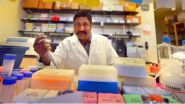(Press-News.org) An analysis of data from the Framingham Offspring Study – a long-term study that follows children of participants in the original Framingham Heart Study – may have answered a question that has troubled individuals considering stopping smoking: do the health effects of any weight gained after quitting outweigh the known cardiovascular benefits of smoking cessation? The report in the March 13 issue of JAMA concludes that the benefits of stopping smoking far exceed any weight-gain associated risk.
"Among people without diabetes, those who stopped smoking had a 50 percent reduction in the risk for heart attack, stroke or cardiovascular death, and accounting for any weight increase didn't change that risk reduction," says James Meigs, MD, MPH, of the General Medicine Unit at Massachusetts General Hospital (MGH) senior author of the JAMA report. "In patients with diabetes – among whom weight gain is a particular concern – we saw the same pattern of a large risk reduction regardless of weight gained."
No study has previously investigated whether smoking-cessation-associated weight gain increases the risk of cardiovascular disease. One did look at the effects on risk factors such as blood pressure and lipid levels, but none have analyzed the actual occurence of cardiovascular events. Participants in the Framingham Offspring Study, which began in 1971, have a comprehensive medical exam and history taken every four to six years. The current investigation analyzed data from participant visits conducted from the mid 1980s into the mid-2000s, which covering the third to eighth visits for the overall study. The number of participants at each exam cycle ranged from almost 2,400 to about 3,250, totalling 11,148 individual person-exams.
Based on information gathered at each exam, participants were categorized as never smokers, current smokers, recent quitters – who had stopped smoking since their last exam – and long-term quitters. At the third study visit, 31 percent of participants were current smokers, and by the eighth visit only 13 percent continued to smoke. A general trend toward weight gain was seen across all study participants. Smokers, never smokers, and long-term quitters gained an average of 1 to 2 pounds between study visits, while recent quitters had gained an average of 5 to 10 pounds since their previous visit. But no matter how much weight they gained, the risk of cardiovascular events in the six years after quitting dropped in half for participants without diabetes. A similar drop in the incidence of cardiovascular events was seen in participants with diabetes, but it did not reach statistical significance, probably because less than 15 percent of the overall group was know to have diabetes.
"We now can say without question that stopping smoking has a very positive effect on cardiovascular risk for patients with and without diabetes, even if they experience the moderate weight gain seen in this study, which matches post-cessation weight increase reported in other studies," says Meigs, an associate professor of Medicine at Harvard Medical School.
INFORMATION:
Lead author of the JAMA report is Carole Clair, MD, MSc, now at the University of Lausanne, Switzerland. Additional co-authors are Nancy Rigotti, MD, of the MGH Tobacco Research and Treatment Center; Bianca Porneala, MS, MGH Medicine; Caroline Fox, MD, MPH, Framingham Heart Study; and Ralph D'Agostino, PhD, and Michale Pencina, PhD, Boston University. Support for the study includes Swiss National Science Foundation grant PBLAP3127728/1, National Heart, Lung and Blood Institute (NHLBI) grant 5K24HL4440-10, National Institute of Diabetes and Digestive and Kidney Disease grant K24 DK080140 and a grant from the SICPA Foundation of Switzerland. The Framingham Heart Study is supported by the NHLBI.
Massachusetts General Hospital (http://www.massgeneral.org), founded in 1811, is the original and largest teaching hospital of Harvard Medical School. The MGH conducts the largest hospital-based research program in the United States, with an annual research budget of more than $775 million and major research centers in AIDS, cardiovascular research, cancer, computational and integrative biology, cutaneous biology, human genetics, medical imaging, neurodegenerative disorders, regenerative medicine, reproductive biology, systems biology, transplantation biology and photomedicine. In July 2012, MGH moved into the number one spot on the 2012-13 U.S. News & World Report list of "America's Best Hospitals."
END
The first randomised trial to compare treatments for ectopic pregnancies has found no significant differences in subsequent fertility between medical treatment and conservative surgery on one hand, and conservative or radical surgery on the other.
The study, which is published online today (Wednesday) in Europe's leading reproductive medicine journal Human Reproduction [1], compared three ways of treating an ectopic pregnancy: medically by methotrexate injection to interrupt pregnancy in the Fallopian tube; conservative surgery, which preserves the Fallopian tube (known ...
It is estimated that there are 10 million cases of traumatic brain injury globally every year with mild traumatic brain injuries being responsible for 70-90% of these. Incidence is highest among young males.
Current literature suggests that mild traumatic brain injuries cause changes in brain tissues and have important long-term consequences on cognitive function. Deficits have been described in attention, memory, verbal learning and processing speed and may occur in 15-25% of those suffering one of these injuries.
However, little is known about population-wide cognitive ...
When Gulf of Mexico algae don't get enough nutrients, they focus their remaining energy on becoming more and more poisonous to ensure their survival, according to a new study by scientists from North Carolina State University and the National Oceanic and Atmospheric Administration.
The study shows that harmful and ubiquitous Karenia brevis algae, which cause red tide blooms across the Gulf of Mexico, become two to seven times more toxic when levels of phosphorus, a major algal nutrient found in fertilizers and human waste, are low. Like wearing a suit of armor, producing ...
Citizen science surveys compare well with traditional scientific methods when it comes to monitoring species biodiversity – according to new research from the University of East Anglia.
Research published today in the journal Methods in Ecology and Evolution shows that methods to record marine diversity used by amateurs returned results consistent with techniques favoured by peer-reviewed science.
The findings give weight to the growing phenomenon of citizen science, which sees data crowd-sourced from an army of avid twitchers, divers, walkers and other wildlife enthusiasts. ...
Children as young as 3 years old know when they are not sure about a decision, and can use that uncertainty to guide decision making, according to new research from the Center for Mind and Brain at the University of California, Davis.
"There is behavioral evidence that they can do this, but the literature has assumed that until late preschool, children cannot introspect and make a decision based on that introspection," said Simona Ghetti, professor of psychology at UC Davis and co-author of the study with graduate student Kristen Lyons, now an assistant professor at Metropolitan ...
Mouse model studies show that administered genetically or topically, protein Smad7 protects against or heals mouth sores commonly associated with cancer treatment.
In some cancer patients treated with radiation, the mouth sores known as oral mucositis become so severe that feeding tubes are required for nutrition and narcotics are needed for pain. In fact, 40-70 percent of patients treated with upper-body radiation develop the condition to some degree. Currently, there is no FDA approved treatment. A University of Colorado Cancer Center study published this week in the ...
PROVIDENCE, R.I. [Brown University] — As Kenyan citizens negotiated the tensions following the March 4 nationwide elections, memories of the violence that followed the December 2007 vote weighed heavily for many reasons. Among those in any nation with an HIV epidemic, argue authors of a new paper in AIDS Reviews, should be the long-term damage that political conflict can do to public health by disrupting treatment and thereby promoting resistance to antiretroviral drugs and treatment failure.
"It's the long-term consequences that make this a bigger issue," said lead author ...
AUGUSTA, Ga. – A guidance cue that helps kidneys form may also be a red flag that they are in danger, researchers report.
Acute kidney injury, a common and serious complication of hospitalization, is on the increase worldwide, affecting an estimated 6 percent of all hospitalized patients and 30-40 percent of adults and children having cardiopulmonary bypass surgery.
About 10-15 percent of acute injuries translate to chronic kidney damage or failure that may require dialysis or a kidney transplant, said Dr. Ganesan Ramesh, kidney pathologist in the Vascular Biology ...
Dog-strangling vine (Vincetoxicum rossicum) is an exotic plant originating from the Ukraine and southeastern Russia that is becoming increasingly invasive in southern Ontario, Canada. It has been found growing successfully in both disturbed and undisturbed areas, in open fields, forest edges and understories, parks, road edges and railway embankments. The invasive plant effectively competes for light by forming large and dense stands that climb over other plants. A study published in the open access, peer-reviewed journal NeoBiota explores the effects of V. rossicum invasion ...
The Orinoco River flows from the Andes in Colombia to the Atlantic in Venezuela. The area of the basin includes landscapes of the Andes, plains of the Llanos and the Guiana shield. Orinoco's tributary rivers form a basin considered to be the 3rd most important river system on the planet, and one of the most biologically diverse areas of the world.
Colombia has shown a strong commitment to the achievement of the Convention on Biological Diversity's 2010 biodiversity target, by promoting the conservation of at least 10% of its natural ecosystems. Protected Area categories ...




